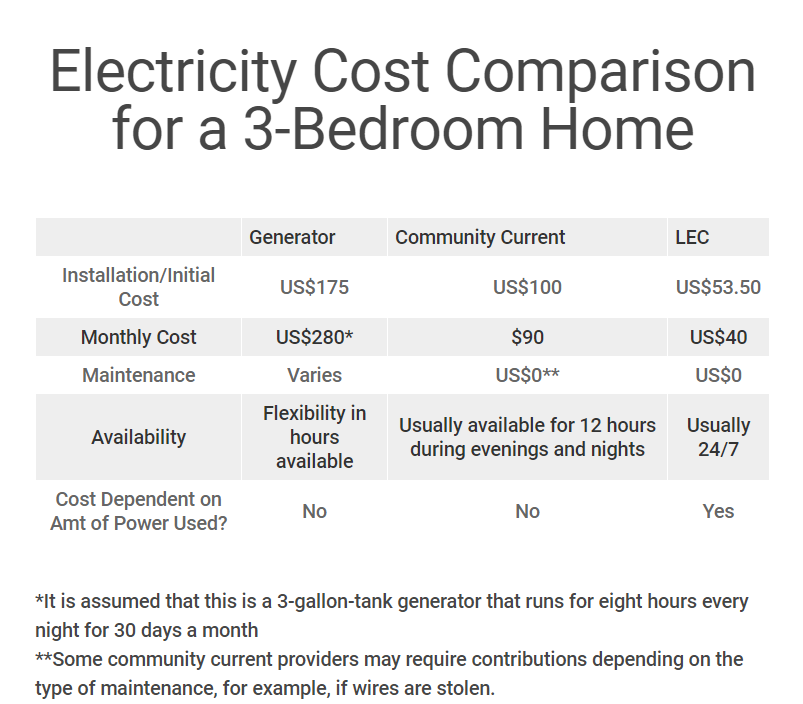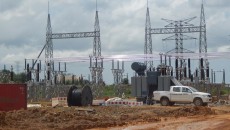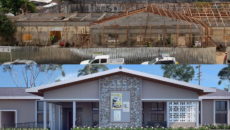MONROVIA, Montserrado – Amid an increasing demand for electric power, residents of average homes in and around Monrovia say electricity from the grid is cheaper to use than other sources.
In separate interviews, the residents told The Bush Chicken that the cost of being connected to the Liberia Electricity Corporation can be far less and more manageable than using private generators or subscribing to a commercial provider in the community.
An average three-bedroom home in Monrovia can use about two amperes of electric current, which covers lighting, fans, a small refrigerator, and a television set.
After a general connection fee of US$53.50 from LEC that covers connection, meter, and wires, most homes can spend between US$30 and US$40 monthly to have electricity from the grid.
“That is depending on how I use my token because, at times where everyone in the house is out and we need to save current, we switch off our breaker,†Patrick Fayiah, a resident of Central Monrovia said.
Fayiah said depending on the management plan, his home can sometimes spend as low as US$10 on electricity a month.
Serena Cole, a resident of Paynesville, said one of the uniqueness of subscribing to the LEC grid is the user’s ability to save money by managing their power usage.
As an alternative, many homes sometimes consider operating a private generator to supply current. A small Tiger-branded generator can be bought at around US$100 to US$200 and would require fuel every time.
A resident of Paynesville, Lyon Kamara, said he uses his small generator to generate power for his lights, radio, and television.
“For every eight hours, I use one gallon of gasoline,†Kamara explained.
While users can manage their power consumption and reduce their costs by turning the generator on or off, Kamara said his generator requires thorough attention in order to troubleshoot if it is malfunctioning.
“If you are not very careful, it’s fast on damaging appliances and sometimes even combustion can be quick,†he said.
Subscribing to community-run grids appears to be most costly for average homes.
A resident of the Thinkers Village community on the Robertsfield Highway, Florence Davis, says her subscription to a nearby community current grid is quite costly.
As a subscriber of the community grid provided by West Coast Energy, a private company, Davis said she had to provide her own wires for about US$80, although the amount may vary depending on the distance and type of wire. She also paid for her own US$10 breaker in addition to a connection fee of US$15.
For subscribing to the grid, she said each customer also pays US$50 per amp every month.
“However, the current runs from 7:00 pm to 6:30 a.m., local time, not the entire day,†she said.
To have electricity during the daytime on special holidays and Sundays, Davis said customers also pay an extra L$200 per amp each.
Dominic Farr, a subscriber of another community current grid in the Baptist Seminary community, said, unlike the LEC grid, the monthly charge with community current is flat, with no option for managing one’s consumption to reduce the cost.
He said the frequency of outages is also very high and customers are often not reimbursed for the time the service was not provided.
One of the benefits of the LEC grid over other options is that a customer does not need to buy new equipment when increasing the energy load. For example, if a customer buys an extra appliance, he or she would generally not be expected to buy any additional equipment.
However, with a private generator, if the appliance demands a load much higher than the existing generator, the user would have to purchase a higher capacity equipment. Community current users would have to request additional amps and pay extra.

A comparison of the cost of electricity for an average two-amp three-bedroom home in Monrovia. Data used are from unscientific surveys but they are quite representative.
West Coast Energy CEO Paul Kollie said his company has been providing services to more than 300 homes in the Thinkers Village and Baptist Seminary communities for the past five years, using eight fairly-used Perkins diesel generators.
Kollie said the company operates eight 100 kva generators at four powerhouses. Some are in operation while the others are on standby. Each of the machines, Kollie said, were bought at around US$20,000 each.
“We went after fairly used machines because a new generator of this size would cost us almost US30,000 each and we could not afford to pay such,†he said.
He said running a community current business is a risky venture, giving the costs attached.
He said per night, each of the four operating generators consumes 48 gallons of diesel fuel at a rate of US$3.25, thus amounting to US$624 to run the four machines a night.
In addition to the fuel, he said monthly overhead operations, including maintenance, can take up a lot of money.
While the options provided makes it obvious that LEC would be the preferred choice for residents of metropolitan Monrovia, most residents of the region still do not have all these options available. For most, the choice is between buying a generator or connecting to community current. Unless LEC speeds up its rate of connection, many households will continue to spend income that could be spent in other areas.
Featured photo by Gbatemah Senah



